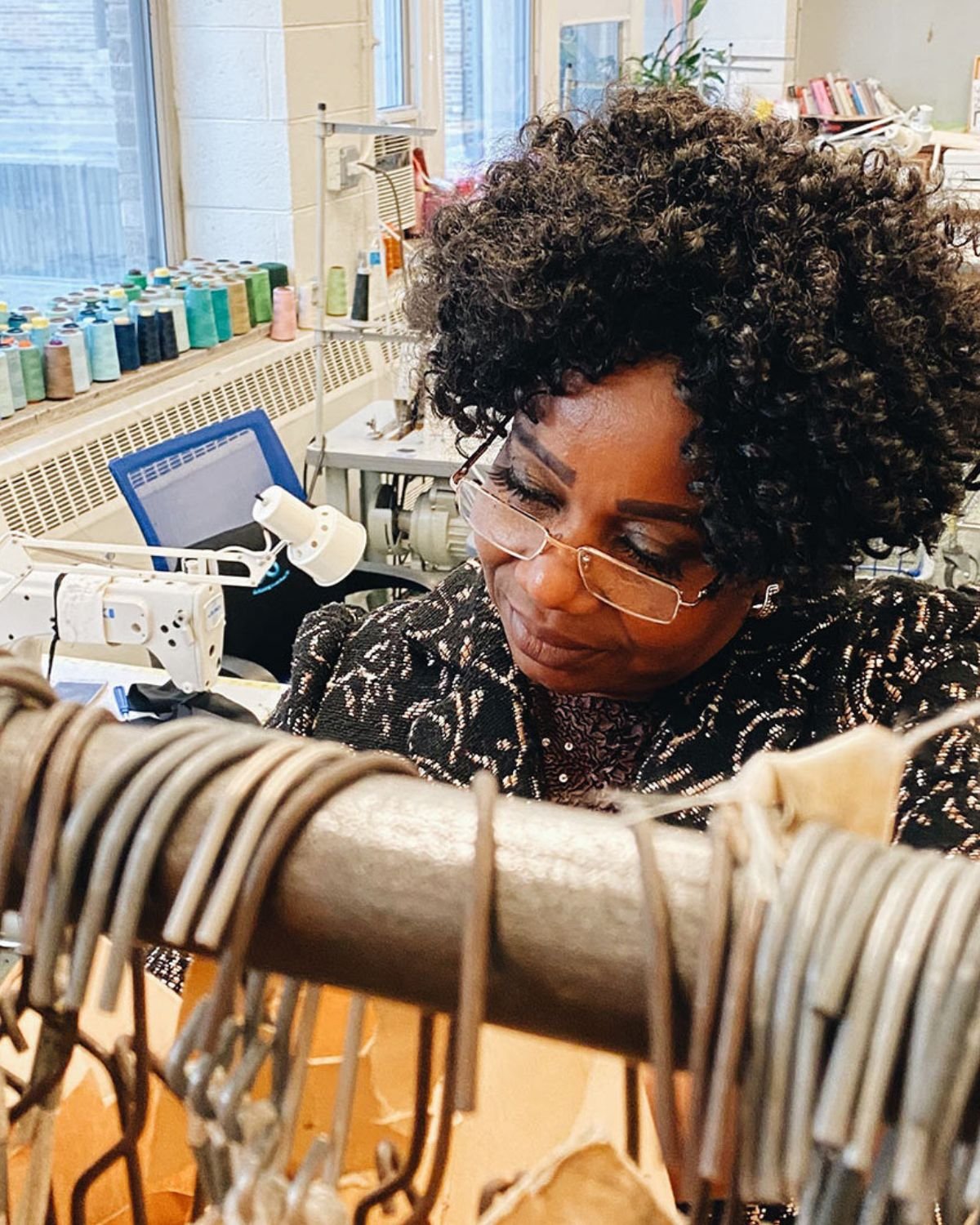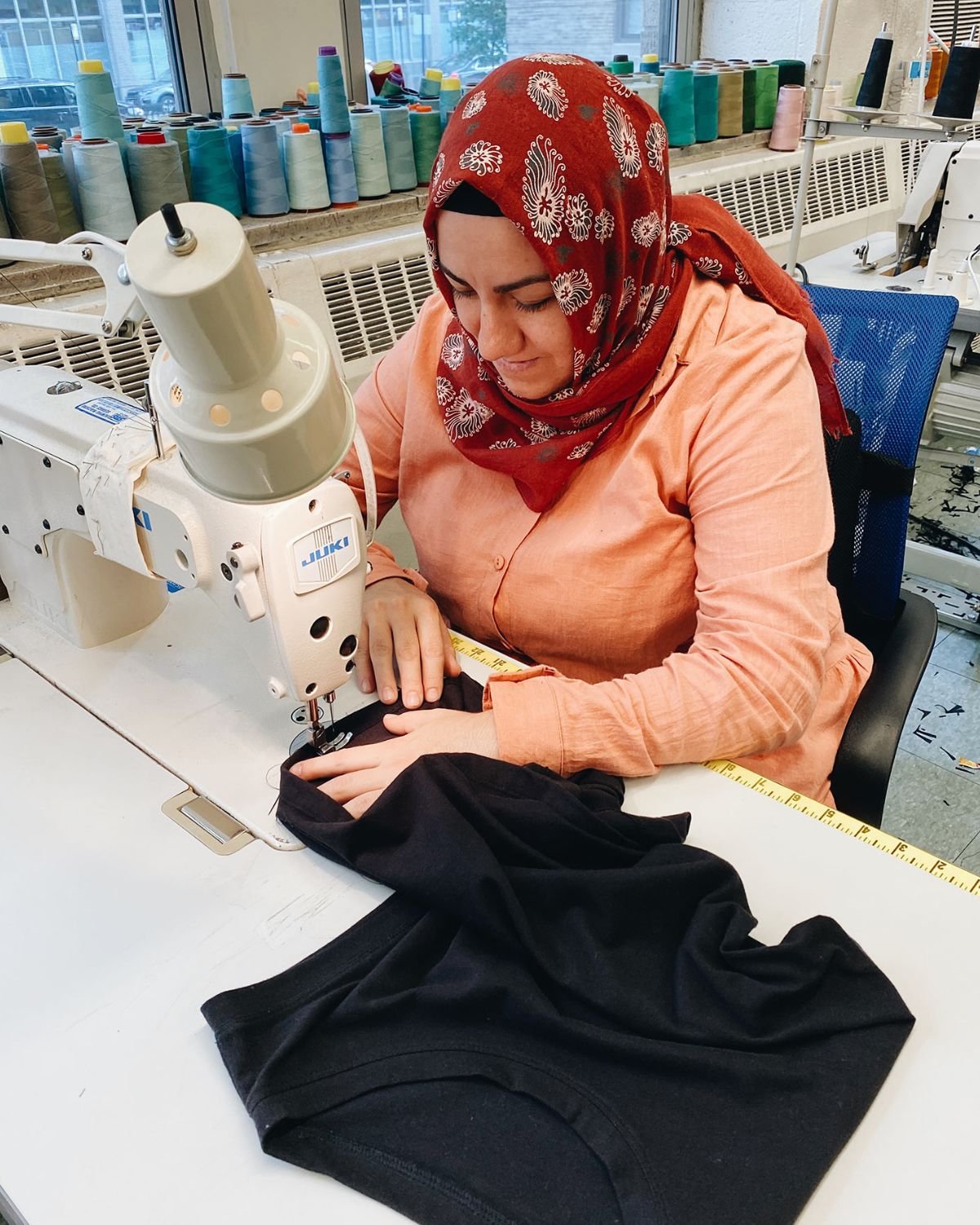Sustainable Fashion Co-Ops Shifting the Power Dynamics of the Industry
By Stella Hertantyo
Image credit: The Blue Tin Production Co-Op
One of the defining characteristics of the current inherently unsustainable fashion system is extreme power imbalances.
These imbalances lead to exploitation of garment makers and people working in the fashion supply chain, degradation of natural ecosystems, waste colonialism, and cultural misappropriation.
These power dynamics are embedded into the business model of fast fashion. So shifting the status quo will require us to embrace alternative business models — like fashion co-ops.
What is A Fashion Co-Op?
A “fashion co-op” is the shortened term for “fashion cooperative”.
As Ngozi Okaro of Custom Collaborative shared on the Conscious Style Podcast, “a worker cooperative is like any other business, except for the people who work in the company, also own it and make all important decisions. This is an important way to not only provide people with ownership opportunities but to also spread values of democracy in collective work.”
A 2019 report by Fifty by Fifty explains that mission-driven employee-owned businesses offer an alternative to investor-owned, publicly traded companies that are solely focused on short-term gains for shareholders, rather than long-term benefit for their communities, workers, or the environment.
Further, being involved in decision-making processes and being granted a sense of agency often increases worker satisfaction. In employee-owned businesses, people feel as though their ideas, perspectives, and thoughts are an integral part of business functioning.
Fashion co-ops are also key to reducing overproduction and building up localized fashion systems — two key elements of a degrowth fashion future.
Fashion Co-Ops As A Pathway Towards Degrowth
Degrowth in fashion is the idea that we need to challenge the current business model of fast fashion and find ways to bring the industry back into alignment with planetary boundaries in an equitable way that supports worker wellbeing.
The structure of fashion co-ops align with these core pillars of a degrowth fashion future.
Creating a fashion business where the makers are the ones that also run, own, and profit from the manufacturing means that the business will be more equitable.
Co-ops are also often more sustainably-minded, since "if the people who are putting in the labor are also owners, then they’re less inclined to overproduce, because it’s their time and their resources that they’re wasting", Okaro explained on Conscious Chatter.
And fashion co-ops contribute to creating localized fashion systems. Many small fashion businesses and fashion co-ops that prioritize local production are more in tune with the needs and contexts of the communities they work in, allowing them to act with more care and consideration for their contexts. Plus, the wealth remains within the community.
In short:fashion co-ops are beneficial for local economies, the natural environment, and human rights.
4 Employee-Owned Fashion Co-Ops Rethinking the Business of Fashion
Started in 1968 with the aim to improve the lives of women living in rural Uruguay, this 54-year-old artisan-owned co-op has stayed true to their vision to this day. Manos del Uruguay is an ecosystem of 12 co-ops. Each co-op has a workshop that is located in a small village in Uruguay’s countryside.
The collection of co-ops aims to create jobs that provide financial stability, but also an opportunity for personal development. There is one material that connects all the women in this co-op: wool.
Using wool, and drawing on generational skills and indigenous techniques passed down from their grandmothers, the women of Manos del Uruguay create handcrafted garments and yarns, including their Potrero Poncho and Alegria Grande Yarns.
They dye in small batches, knit by hand, and weave using traditional looms. And any surplus yarn gets repurposed into something new.
As a reminder of the rich stories behind these creations, each garment or ball of yarn is finished off with a tag that holds the name of the artisan who made it, and the village where the co-op is located.
The artisans are the owners of the company and the profits are shared among the co-ops or reinvested in the organization. As a co-op that has stood the test of time, Manos del Uruguay is a success story that teaches us that a more ethical fashion future is well within reach.
Co-op offering: Small batch production of sustainable and ethical yarns, garments, and homeware. The artisans are present at every step of the way — from spinning and dyeing to knitting, and weaving.
Location: Uruguay
Andel is a Scandinavian fashion brand, founded in 2021, that believes that the way a business is structured is directly linked to how sustainable it is. With this in mind, Andel is putting sustainability and ethics into practice by intentionally structuring their brand as a clothing co-op.
Designed to be worn by everyone, their minimalistic yet statement seasonless garments are a response to the “aesthetic fickleness” of fashion’s rapid trend cycles. For their debut collection — including their Back Pleated Trouser and Necktie Harrington Jacket — they paid careful attention to detail to ensure that the impact of the garments was kept to a minimum.
They used only upcycled, deadstock, or locally-crafted fabrics — and no new fossil fuels or virgin plastics are involved in the making of their products. With a strong dedication to transparency, all information about the sourcing and production of each garment is available on their website.
Andel’s fashion co-op structure means that all employees own an equal share in the business and have an equal say in decisions. In doing so, Andel is showing us how to create a fashion system in which profits are equitably distributed and reinvested, instead of purely lining the pockets of those at the top.
Co-op offering: Seasonless, made-to-order slow fashion garments, produced in small batches, made from low-impact materials such as deadstock or upcycled fabrics.
Location: Scandinavia
When founder Hoda Katebi dreamed of starting her own ethical clothing line, but then experienced how difficult it was to find ethical manufacturing, the idea for The Blue Tin Production Co-Op was born.
In an article for The Good Trade, Katebi shared that she was fed up with sweatshops and she realized that the only way to challenge the fashion system was to put it directly in the hands of workers.
Now The Blue Tin Production Co-Op is a Black and Brown worker-owned and run business that offers clothing production services — for designers, brands, and retailers — that prioritize the wellbeing of people and the planet.
An average of 60% of their revenue goes directly toward labor and benefits, and all profits are shared equally among the members. Based on a cooperative decision-making model, all salaries, work hours, benefits, and day-to-day operations are determined collectively by the workers who own the company.
Beyond employment, the co-op also provides mental and physical healthcare, legal and social services, child care, transportation, know-your-rights training, and language services.
In all that they do, sustainability is a core practice. As part of this focus, they have a multi-step process for waste reduction, as well as prioritizing local designers who work with sustainable materials.
The Blue Tin Production Co-Op is actively building a localized fashion future by creating practical examples of what garment worker power and community wellbeing look like.
Co-op offering: Small-batch sustainable and ethical clothing design and manufacturing with in-house cut and sew services, end-to-end product development, and no minimum order quantities.
Location: US
Based in the foothills of Western North Carolina, Opportunity Threads is a worker-owned, cut-and-sew textile manufacturing business. This state and area were once home to a prosperous textile manufacturing industry that collapsed after a series of economic events.
Founder Molly Hemstreet set out to help revive the once-thriving industry, but this time with a strong focus on sustainability and ethics. So she launched Opportunity Threads, which is now among the strongest worker-owned, immigrant-led manufacturers and clothing co-ops in the country.
Everyone in the company earns a living wage. And while the textile industry generally suffers high turnover rates, Opportunity Threads has retained 100% of all original workers over five years. All members of the clothing co-op have equal voting rights on all decisions made about financial and business management issues.
If you browse through their Instagram, you’ll be greeted by vibrant images of their workspace and meet the people that manufacture their clothing. Opportunity Threads is indeed threading change and creating endless opportunities for fashion to be a force for good!
Co-op offering: Sustainable and ethical garment production for entrepreneurs and mid-sized companies.
Location: US
About the Author:
Stella Hertantyo is based in Cape Town, South Africa, and is currently completing her PGDip in Sustainable Development to accompany her undergraduate in Multimedia journalism. She is a slow-living enthusiast and a lover of low-impact fashion.
She is passionate about encouraging an approach to sustainability that is inclusive, accessible, and fun as we try to figure out how to create a more sustainable and just world, together.
When Stella is not in front of her laptop doing uni work, you'll probably find her reading, writing, illustrating, or baking/cooking. A dip in the ocean, or a walk in the mountains, are the two things that bring her the most peace.















